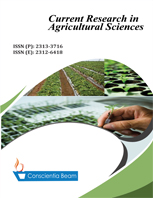Effects of alternative production system on the growth performances of two varieties of tomato (Solanum lycopersicum l.)
DOI:
https://doi.org/10.18488/cras.v11i2.3934Abstract
This paper examines the effect of an alternative production system on the growth performances of two varieties of tomatoes. Alternative farming systems provide a process for crop production using materials of natural origin to enrich soil and protect crops, thereby reducing the use of agrochemicals. Padma 108 F1 and Platinum 701 F1 tomato varieties were cultivated using both conventional and alternative farming methods in a completely randomized design. On the alternative farming method plot, cured cow dung manure was used for soil enrichment, and manual weeding was employed. In addition, insect pests’ control was achieved with a concoction of garlic (6 g/l), ginger (10 g/l), clove (5 g/l), onions (10 g/l), and dried capsicum pepper (4 g/l). Fungicidal treatment was by an infusion of leaves from Siam weed, neem, and bitter leaf (5 g/l each). Plant height, numbers of leaves, flowers, and fruits produced were determined manually for twelve weeks of observation on both plots. The highest height of 107.5 cm was observed in Padma tomato plants, while the least height (103.5 cm) was obtained for Platinum variety, at week 12. However, there was no significant difference (P<0.05) in the heights of the two tomato varieties at full maturity and in between the farming systems. The same trend was observed for number of leaves, flowers, and fruits produced. The alternative farming model in this study produced similar growth performances in the two tomatoes varieties, and exhibits the potential to be a substitute for the conventional farming system of tomato as practiced by the smallholder farmers. Further studies on the bioactive components of the botanical materials used would be encouraged.

